七年级下册英语人教版预科导学案Unit1-5
- 格式:docx
- 大小:119.82 KB
- 文档页数:39
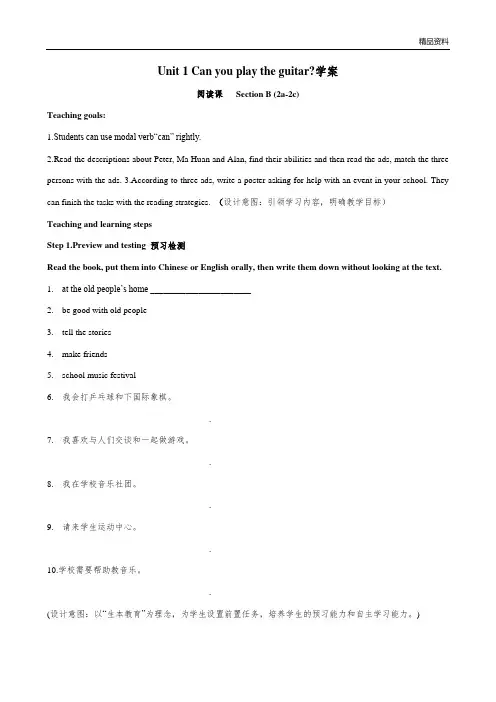
Unit 1 Can you play the guitar?学案阅读课Section B (2a-2c)Teaching goals:1.Students can use modal verb“can” rightly.2.Read the descriptions about Peter, Ma Huan and Alan, find their abilities and then read the ads, match the three persons with the ads.3.According to three ads, write a poster asking for help with an event in your school. They can finish the tasks with the reading strategies. (设计意图:引领学习内容,明确教学目标)Teaching and learning stepsStep 1.Preview and testing 预习检测Read the book, put them into Chinese or English orally, then write them down without looking at the text.1.at the old people’s home _______________________2.be good with old people________________________3.tell the stories___________________4.make friends ____________________5.school music festival_____________6.我会打乒乓球和下国际象棋。
__________________________________.7.我喜欢与人们交谈和一起做游戏。
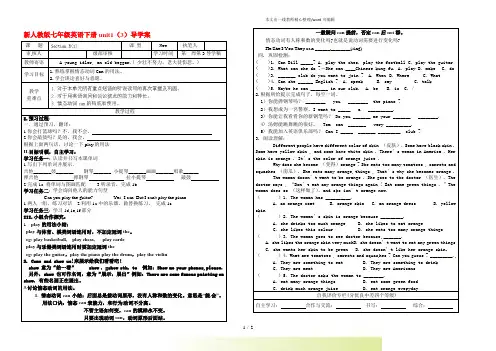
新人教版七年级英语下册unit1(3)导学案课题课型New 执笔人审核人级部审核学习时间第周第3导学稿教师寄语 A young idler, an old beggar.( 少壮不努力,老大徒伤悲。
)学习目标1.熟练掌握情态动词Can的用法。
2.学会谈论喜好与意愿。
教学重难点教学过程I.预习过程:一.通过预习,翻译:1.你会打篮球吗?不,我不会。
2.你会敲鼓吗?是的,我会。
根据上面两句话,讨论一下play的用法.II.目标引领,自主学习:学习任务一:认读并书写本课单词1.写出下列单词并展示.吉他_______鼓_______ 钢琴_______ 小提琴_______画画_______唱歌______弹吉他弹钢琴拉小提琴敲鼓2.完成1a 将单词与图画匹配.3.听录音,完成1b.学习任务二:学会询问他人的能力句型.---- Can you play the guitar? ---- Yes, I can. But I can't play the piano.1.两人一组,练习对话2.利用1a中的乐器,做替换练习,完成1c.学习任务三:学习1d,1e,1f部分III.小组合作探究:1.play的用法小结:play与体育、棋类词语连用时,不加定冠词the。
eg: play basketball, play chess, play cardsplay与乐器类词语连用时要加定冠词theeg: play the guitar,play the piano play the drum,play the violin2. Come and show us!来展示给我们看看吧!show 意为“给…看” show . =show sth. to 例如:Show me your phonos,please. 另外,show 也可作名词,意为“展示,展出”例如:There are some famous painting on show. 有些名画正在展出。
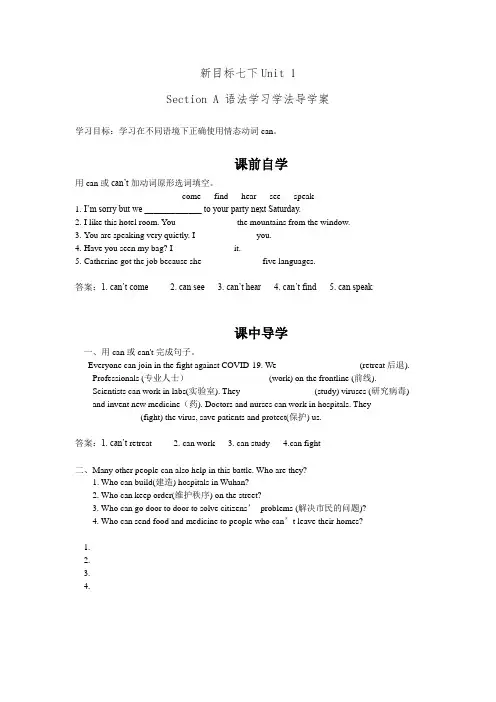
新目标七下Unit 1Section A 语法学习学法导学案学习目标:学习在不同语境下正确使用情态动词can。
课前自学用can或can’t加动词原形选词填空。
come find hear see speak1.I’m sorry but we _____________ to your party next Saturday.2.I like this hotel room. You _____________ the mountains from the window.3.You are speaking very quietly. I _____________ you.4.Have you seen my bag? I _____________ it.5.Catherine got the job because she _____________ five languages.答案:1. can’t come 2. can see 3. can’t hear 4. can’t find 5. can speak课中导学一、用can或can't完成句子。
Everyone can join in the fight against COVID-19. We ________ ________ (retreat后退).Professionals (专业人士)________ ________ (work) on the frontline (前线).Scientists can work in labs(实验室). They ________ ______ (study) viruses (研究病毒) and invent new medicine(药). Doctors and nurses can work in hospitals. They ________ ________ (fight) the virus, save patients and protect(保护) us.答案:1. can’t retreat 2. can work 3. can study 4.can fight二、Many other people can also help in this battle. Who are they?1. Who can build(建造) hospitals in Wuhan?2. Who can keep order(维护秩序) on the street?3. Who can go door to door to solve citizens’problems (解决市民的问题)?4. Who can send food and medicine to people who can’t leave their homes?1.________________________________________________2.________________________________________________3.________________________________________________4.________________________________________________答案:1.Workers. 2.Police officer.munity (社区) workers.4.Couriers (快递员)三、用Can I...? Could I....?或Can you...? Could you...?作出有礼貌的请求。
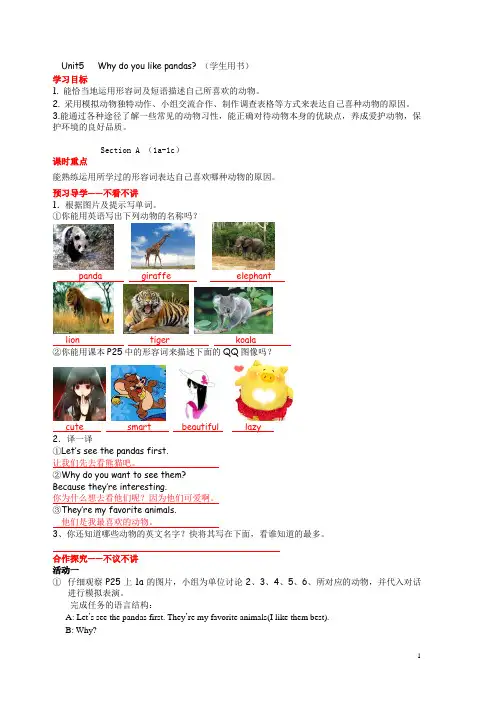
Unit5 Why do you like pandas? (学生用书)学习目标1. 能恰当地运用形容词及短语描述自己所喜欢的动物。
2. 采用模拟动物独特动作、小组交流合作、制作调查表格等方式来表达自己喜种动物的原因。
3.能通过各种途径了解一些常见的动物习性,能正确对待动物本身的优缺点,养成爱护动物,保护环境的良好品质。
Section A (1a-1c)课时重点能熟练运用所学过的形容词表达自己喜欢哪种动物的原因。
预习导学——不看不讲1.根据图片及提示写单词。
①你能用英语写出下列动物的名称吗?panda giraffe elephantlion tiger koala②你能用课本P25中的形容词来描述下面的QQ图像吗?cute smart beautiful lazy2.译一译①Let’s see the pandas first.让我们先去看熊猫吧。
②Why do you want to see them?Because they’re interesting.你为什么想去看他们呢?因为他们可爱啊。
③They’re my favorite animals.他们是我最喜欢的动物。
3、你还知道哪些动物的英文名字?快将其写在下面,看谁知道的最多。
合作探究——不议不讲活动一①仔细观察P25上1a的图片,小组为单位讨论2、3、4、5、6、所对应的动物,并代入对话进行模拟表演。
完成任务的语言结构:A: Let’s see the pandas first. They’re my favorite animals(I like them best).B: Why?C:Because they’re very cute.②假设我们来到了羊世界,你想先去看谁呢?与小组伙伴一起根据下面的图片练习对话,任务语言如下。
A: A: A:B: B: B:A: A: A:活动二①听P25上1b的磁带第一遍,完成1b 中的听力题,②听第二遍,仿照例句用完整的句子写出你所听到的动物的特点。
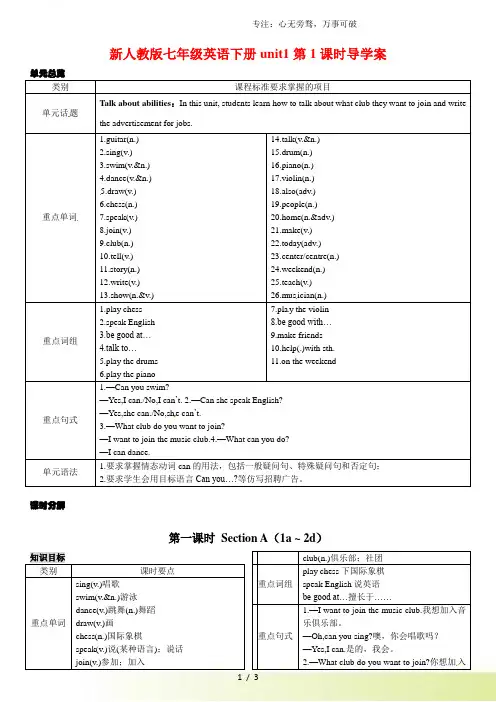
专注:心无旁骛,万事可破新人教版七年级英语下册unit1第1课时导学案单元总览类别课程标准要求掌握的项目单元话题Talk about abilities:In this unit, students learn how to talk about what club they want to join and writethe advertisement for jobs.重点单词1.guitar(n.)2.sing(v.)3.swim(v.&n.)4.dance(v.&n.)5.draw(v.)6.chess(n.)7.speak(v.)8.join(v.)9.club(n.)10.tell(v.)11.story(n.)12.write(v.)13.show(n.&v.)14.talk(v.&n.)15.drum(n.)16.piano(n.)17.violin(n.)18.also(adv.)19.people(n.)20.home(n.&adv.)21.make(v.)22.today(adv.)23.center/centre(n.)24.weekend(n.)25.teach(v.)26.mus ician(n.)重点词组1.play chess2.speak English3.be good at…4.talk to…5.play the drums6.play the piano7.pla y the violin8.be good with…9.make friends10.help(.)with sth.11.on the weekend重点句式1.—Can you swim?—Yes,I can./No,I can’t. 2.—Can she speak English? —Yes,she can./No,sh e can’t.3.—What club do you want to join?—I want to join the music club.4.—What can you do? —I can dance.单元语法1.要求掌握情态动词can的用法,包括一般疑问句、特殊疑问句和否定句;2.要求学生会用目标语言Can you…?等仿写招聘广告。
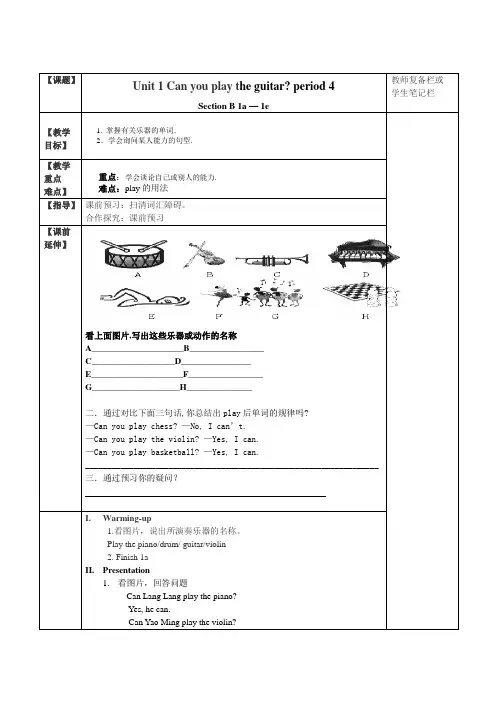
【课题】Unit 1 Can you play t he guitar? period 4Section B 1a — 1e 教师复备栏或学生笔记栏【教学目标】1. 掌握有关乐器的单词.2.学会询问某人能力的句型.【教学重点难点】重点:学会谈论自己或别人的能力. 难点:play的用法【指导】课前预习:扫清词汇障碍。
合作探究:课前预习【课前延伸】看上面图片,写出这些乐器或动作的名称A_____________________B_________________C___________________D________________E_____________________F_________________G____________________H_______________二.通过对比下面三句话,你总结出play后单词的规律吗?—Can you play chess? —No, I can’t.—Can you play the violin? —Yes, I can.—Can you play basketball? —Yes, I can.___________________________________________________________________三.通过预习你的疑问?I.Warming-up1.看图片,说出所演奏乐器的名称。
Play the piano/drum/ guitar/violin2. Finish 1aII.Presentation1.看图片,回答问题---Can Lang Lang play the piano?--- Yes, he can.--- Can Yao Ming play the violin?5. He_____ t o join the music club. A. don’t want B. doesn’t wants C. would like6.-Are they good at ____? -Yes, they are. A. swim B. to swim C. swimmingII.首字母填词1. Can you play the v____________?2. He can d_____________ and sing.3. I want to join the art c___________.4. Does he play the p__________ every day?5. He can p ___ _ the drums.IV.连词成句(请注意大小写和标点符号)1.want, join, the, club, to, music, I2.no, you, I, play, the, can , guitar, can't_______________________________________________________________________ 3.club, you, do, want, join, to, what_______________________________________________________________________ 4.to, want, the, join, we, English club_______________________________________________________________________IV翻译句子1.你会唱歌吗? 是的,我会._________________________________________________________2.我不会弹钢琴,但是我会跳舞_________________________________________________________3.他会弹吉他吗?不,他不会_________________________________________________________4.Jane会下象棋吗? 不,不会.她会拉小提琴_________________________________________________________。
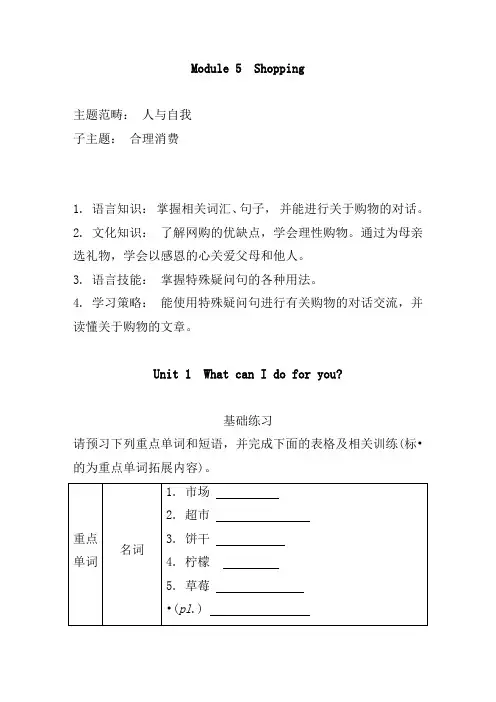
Module 5Shopping主题范畴:人与自我子主题:合理消费1. 语言知识:掌握相关词汇、句子,并能进行关于购物的对话。
2. 文化知识:了解网购的优缺点,学会理性购物。
通过为母亲选礼物,学会以感恩的心关爱父母和他人。
3. 语言技能:掌握特殊疑问句的各种用法。
4. 学习策略:能使用特殊疑问句进行有关购物的对话交流,并读懂关于购物的文章。
Unit 1What can I do for you?基础练习请预习下列重点单词和短语,并完成下面的表格及相关训练(标•的为重点单词拓展内容)。
学以致用根据语境或提示,完成填空。
1. The bird looks (look) very beautiful.2. I usually buy some vegetables at the big m arket .3. This kind of biscuit (饼干) tastes nice. I want some more.4. —What s ize bowl of noodles would you like?—I'd like medium, please.5. The p rice of the puter is 5,000 yuan. I can't afford it.6. The grapes are very fresh (新鲜的) and they also taste good.7. All these books are on s ale today and tomorrow.8. There is a supermarket (超市) next to my home, so it's convenient(方便的) to buy things.9. I went to a farm to pick some strawberries (strawberry) last weekend. It was really fun.佳句仿写用句中黑体词或短语仿写句子。
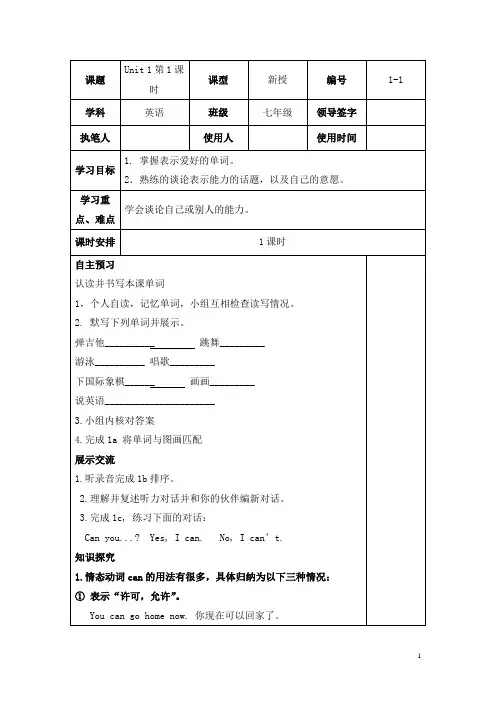
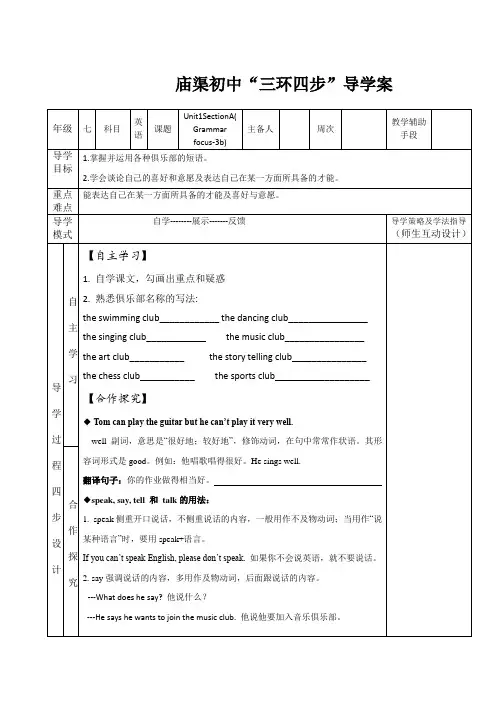
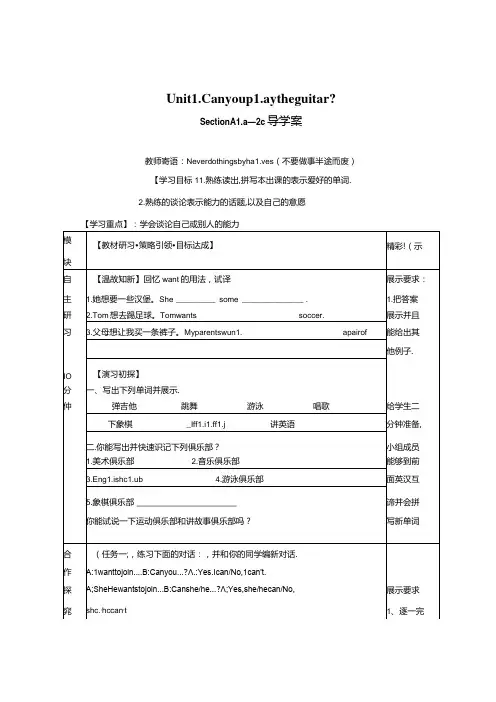
Unit1.Canyoup1.aytheguitar?
SectionA1.a—2c导学案
教师寄语:Neverdothingsbyha1.ves(不要做事半途而废)【学习目标11.熟练读出,拼写本出课的表示爱好的单词.
2.熟练的谈论表示能力的话题,以及自己的意愿
SectionA2d-3c导学案教师寄语::NeVCrdOthingSbyha1.V(不要做事空途而废)I学习目标】:1维续学习.情态动词Can的用法并熟练应用
2.学习了解海报
Unit1.Canyoup1.aytheguitar?
SectionBIa-If导学案
教师寄语:Neverdothingsbyha1.ves(不要做事半•途而废)【学习目标】:1.熟练读出,书写本节课彳『关乐器的通闻.
2.学会询问某人能力的句型..
SectionB2a-3b导学案教师寄语:Neverdothingsbyha1.ves(不逑做,∣∣'Γ,途而废)【学习目标】:1.热练读出,书写本节课有关乐器的单词.
2.学会询问某人能力的句型..。
- 1 - Unit 1 Can you play the guitar? Section A 【教师寄语】Never do things by halves. 做事不要半途而废。 【学习目标】1. 掌握表示爱好的单词. 2.熟练的谈论表示能力的话题,以及自己的意愿. 【学习重点】1. 情态动词can小结 2. play的用法小结 【学习过程】 1. New words and expressions guitar/ɡɪ'tɑ:(r)/ n.吉他 sing /sɪŋ/ v.唱;唱歌 swim/swɪm/ v.&n.游泳 dance/dɑ:ns/, /dæns/ v.跳舞;n.舞蹈 draw/drɔ:/ v.画 chess/tʃes/ n.国际象棋 speak/spi:k/ v.说(某种语言);说话 join /dʒɔɪn/ v.参加;加入 club /klʌb/ n.俱乐部;社团 tell /tel/ v.讲述;告诉 story/'stɔ:ri/ n.故事;小说 write/raɪt/ v.写作;写字 show/ʃəʊ/ n.演出;节目; v.展示 kung fu /kʌŋ'fu:/ n.(中国)功夫 play chess 下国际象棋 play the piano 弹钢琴 be good at doing sth =do well in 擅长做某事 speak English 说英语 talk to... 跟...说 tell sb (not) to do sth 告诉某人(不要)做某事 want to do sth.想要做某事 2. Read and practice 1) ---Can you dance? ---Yes, I can./No, I can't. ---Can he dance? ---Yes, he can./No, he can't. --Can she dance? ---Yes, she can./ No, she can't. ---Can they dance? ---Yes, they can./No, they can't. 2) ---What can you do? --I can swim. 3) ---What club do you want to join? ---I want to join the sports club. 4) You are very good at telling stories. 你非常擅长讲故事。 5) What about you?/ How about you? 你呢? 3. 知识点拨 1) 情态动词can的用法 【观察】(1) I can swim. (2) ---Can you sing? ---Yes, I can. / No, I can't. - 2 -
【发现】can为情态动词,意为―能;会;可以‖,表示能力或许可,后面直接跟动词原形,主语单复数均可。变为否定句时,在can后面加上否定词not即可,可缩写为can't;变为一般疑问句则是把can放在句首并把首字母变大写。 【Exercise】用情态动词can的适当形式填空。 (1) I _______ sing. (2) ---_______ he swim? ---No, he __can’t______. (3) They _______ dance. But they _______ speak English. They don't know English.
2)动词play的用法 【观察】(1) I can play chess. (2) Can you play the guitar? (3) She plays soccer well. 【发现】play在此意为―演奏;弹;打;踢‖。后跟西洋乐器时,乐器名称前面要加冠词the;后跟―球类、棋类、游戏类‖名词时,这些名词前面不能加任何冠词。 【Exercise】选择最佳答案。 ( ) (1) I like playing ________ guitar, but I don't like playing ________ chess. A. /; the B. the; / C. the; the ( ) (2) Can you play ________ ping pong or play ________ basketball? A.the; the B./; the C./; /
3)also, too, either 区别 also 位于句中,放在be动词/助动词/情态动词之后,行为动词之前,多用于肯定句中。 too 位于句末,前常有逗号,多用于口语,肯定句;或作为插入语放在句中。 either 常置于句末,前常有逗号,用于否定句中。在肯定句变为否定句时,其中的also.too都要改为either。 ① I like English and she likes English, too.= I like English and she also like English. 我喜欢英语,她也喜欢英语。 ② My brother likes bananas, I like them too. 我弟弟喜欢香蕉。我也喜欢它们。 ③ You don’t like this hat. I don’t like it, either. 你不喜欢这个帽子。我也不喜欢它。 【Exercise】选择最佳答案。 - 3 -
1. David doesn’t like rice noodles; his son doesn’t,__C____. A. also B. too C. either D. not 2. He wants to watch TV, and his sister _____wants to watch TV. A. also B. too C.either
4)be good at doing sth=do well in 【观察】You are very good at telling stories. 你非常擅长讲故事。 【发现】be good at 相当于do well in 表示―擅长...,在...方面做得好‖,后可接名词、代词、动名词。 ① She is good at dancing.= She does well in dancing. 她擅长跳舞。
【自主检测】 I.在B栏中选择A栏的答句: A B ( )1. Can you sing or dance? A. Yes, I am. ( )2.. Are you playing football? B. I can dance.. ( )3. What club do you want to join? C. Yes, I can. ( )4. Can you draw? D. Sounds great. ( )5. Let’s tell stories. E. Chess club. II. 精挑细选 1. Can you ____A____ English? A. speak B. talk C. say 2. Can he ___A_______ basketball? A. play B. plays C. playing 3. My brother want __B_____ the chess club. A. join B. to join C. joins 4. Mary can play the chess___C_____ she can't swim. A. and B. or C. but 5. His brother plays ___C____ piano every day. A. / B. a C. the Ⅲ. 根据要求完成句子 1. Li Lei can draw.(改为一般疑问句并作肯、否定回答) ---_________ Li Lei _________? ---Yes, he _________. - 4 -
---No, he _________. 2. He can swim in the river.(改为否定句) He _________ _________ in the river. 3. to, the, club, I, swimming, join, want(连词成句) _____________________________________________ 4. Jane can join the chess club.(对划线部分提问) _________ club _________ Jane join? Ⅳ. 根据汉语完成句子 1.你会弹吉他吗?不,不会。 ---_________ you _________ the _________? ---No, I _________. 2.我想参加英语俱乐部。 I _________ to _________ the English _________. 3.我会画画,但不会游泳。 I can _________, but I _________ _________. 4.我说英语非常流利,他下国际象棋非常棒。 I _________ _________ very well, and he _________ _________ very well. 5.我会唱歌金额跳舞。 I can _________ and _________.